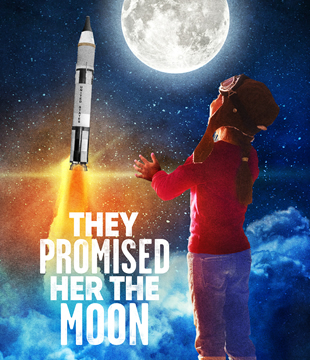“Ready or Not…”
They Promised Her the Moon, by Laurel Ollstein, tells the story of Jerrie Cobb, one of 12 women who were part of NASA’s astronaut training program in the 1960’s. Despite equaling or outperforming the likes of John Glenn and Alan Shepard during testing, Cobb was not selected to go on any of the missions. It doesn’t take a rocket scientist to guess why.
Nonetheless, it was quite unsettling to watch as, quite literally, a rocket scientist – along with congressmen and another famous woman pilot, Jackie Cochran – spelled it out: the world was “not ready” for a female astronaut. More about the world’s lack of readiness in a minute, but first, a little about my own expectations.
I knew going in that sexism would be the main motivating factor behind keeping a woman out of a rocket in 1960. Still, I suppose I expected there to be at least some semi-legitimate, quasi-logical reasoning put forth by the scientists in the show. Maybe, I thought, there was some aspect of cockpit design or spacesuit size or plumbing that would have made it difficult for NASA to accommodate the presence of a multi-gendered crew. It wouldn’t have made the situation any less sexist, but it would at least have been rationally satisfying to hear someone say, “Look, we all want to let you go, but we need to beat the Russians to the moon and we just can’t afford to redesign the toilets at this stage of the game.” But no one offered anything close to a scientific rationale for having an all-male crew.
In fact, the science would have suggested that it was more efficient to have an all-female crew. Even if you discount the testing where Cobb clearly bested her male counterparts, everyone agreed on the simple fact that the women weighed less than the men. Less weight in personnel means more weight available for things like equipment and fuel. But, of course, no one suggested that the men be excluded from the program because of their excessive bulk. I guess the world just wasn’t ready for that.
Maybe I’m not thinking hard enough, but I can’t come up with a single example of significant social change that everyone agreed the world was ready for. The abolition of slavery, the civil rights movement, the fight for gender equality, equal rights for LGBTQ people… all of these issues had vocal opponents claiming that “the world just wasn’t ready”. And in every case, after a significant period of time, those opponents were judged to have been “on the wrong side of history”. So it would seem that readiness just isn’t a good measure of whether or not we should do a particular thing. At least not if by “ready” we mean that everyone is going to be comfortable with the proposed change. So where does the leave us?
I think we need to shift the focus of what we mean when we ask if we’re ready for something. Rather than using our feelings of discomfort or unfamiliarity as reasons for rejecting a proposed change to the status quo, we need to dig in to those feelings and explore all sides of them. Rather than thinking, “That idea makes us too uncomfortable; I don’t think we’re ready for it”, we need to ask questions like: “What about this is making us uncomfortable?”, “What are we afraid will happen?”, “Are those fears rational?”, “What will the consequences for everyone involved be if we don’t change?”
Those can be hard questions to answer – especially the last one. They require a depth of self-knowledge, an ability to be vulnerable and, perhaps most importantly, a level of empathy that can often seem elusively unattainable. Social progress requires hard work – both from the individual members of society and the society as a whole – but the alternative isn’t pretty. If They Promised her the Moon did nothing else, it showed the audience how ridiculous not doing the work looks in hindsight. To an audience in 2019, those characters in the play who opposed the idea of female astronauts seemed small-minded, weak, petty and, in some cases, laughable. All of them were clearly on the wrong side of history.
Does that mean that we need to accept every proposed change that comes down the pike? Is all change progress? No. But it does mean that we need to avoid resisting change based on our immediate feelings of discomfort. Progress requires us to take some risks. We must risk feeling uncomfortable, risk walking into the unknown, and even risk making some mistakes or getting it completely wrong. If we expect to reach the stars, however, we, like Jerri Cobb, have to be willing to shoot for the moon.





